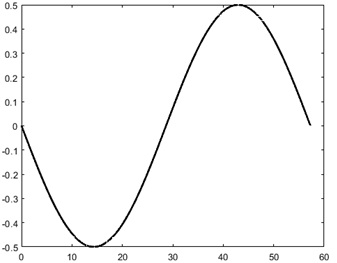Problem 1: Convert the binary data "110101" into analog waveforms using following modulation techniques:
a. Two level Amplitude Shift Keying
b. Two level Frequency Shift Keying
c. Two level Phase Shift Keying
d. Differential Phase shift keying
e. Four level Amplitude Shift Keying
f. Four level Phase Shift Keying
g. Eight level Amplitude Shift Keying
Problem 2: With fc = 1000 kHz, fd = 50 kHz, and M = 16 (L = 4 bits), using Multiple Frequency-Shift Keying (MFSK), compute the frequency assignments for each of the sixteen possible 4- bit data combinations.
Problem 3: Draw the approximate Analog Modulation and Frequency Modulation waveforms in complete steps for the following signal:

Problem 4: Draw the 16 QAM Constellation Diagram having four different amplitude levels and four different phase levels.
Problem 5: Explain and draw the Error Detection Process for Cyclic Redundancy Check (CRC).
Problem 6: Compute the frame check sequence using Cyclic Redundancy Check (CRC) for the following information:
Message = 111010110, Pattern = 101110
Problem 7: Compute the transmitted signal using Direct Sequence Spread Spectrum for the following information:
Input: 101, Locally Generated PN bit stream: 011011010110, T = 4Tc
Problem 8: Explain why the square and circle shapes cells for cellular communications are not appropriate as compared to hexagonal shape cells.
Choosing the most précised and affordable Modulation Techniques Assignment Help service provider organizations will surely assist you in securing top-notch grades. But, from where you will find this kind of online assistance? Undoubtedly, at Tutorsglobe..!!
Tags: Modulation Techniques Assignment Help, Modulation Techniques Homework Help, Modulation Techniques Coursework, Modulation Techniques Solved Assignments, Analog and Frequency Modulation Assignment Help, Analog and Frequency Modulation Homework Help, Cyclic Redundancy Check Assignment Help, Cyclic Redundancy Check Homework Help